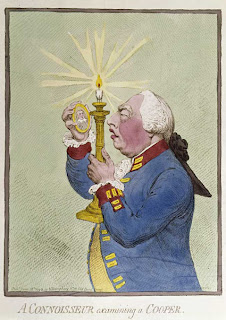Here are more of Stapleton’s views on his fellow Europeans:
Excerpted from THE ROAD TO KNOWLEDGE: Or, Young Man & Woman’s Best Friend, by George Stapleton, published in London in 1797.
As to the PEOPLE, though they are characterized by those of other countries for generosity, they do not display any great share of it among each other; the higher classes seem not to care much for the lower, and the lower care as little for the higher. With respect to the military part, the English soldiers are as good as any in Europe; and as to the sailors, they are the best in the world.
On THE DUTCH:
As to the Dutch, as a people, their character is pretty well known throughout Europe. How far their extreme love of money is reconciled to requisitions and contributions in support of their allies, I know not. It seems to be, however, the general opinion, that, with respect to a change in government, they have been rather mistaken in their politics.
On THE PRUSSIANS:
The inhabitants are stout, robust, laborious people.
On THE SPANISH:
The natives of Spain are represented as proud, haughty, and indolent: even the peasants, like the Welch, keep geneologies of their families. The Spanish ladies are fond of paint, and are kept much at home, through the jealousy of their husbands. The men, at least such as are liberally educated, discover a great genius for learning, as appears from the number of learned men and works which this kingdom has produced, though greatly limited in their researches into some subjects by their excessive bigotry to their religion. As for wit and genius, either in dramatic or romantic performances, they are allowed to be excellent; nor would they be defective in point of politics, were their sentiments not fettered by a despotic government.
were their sentiments not fettered by a despotic government.
On THE GERMANS:
With respect to the people of Germany, their genius has appeared in the invention and improvement of many mechanical arts, especially clockwork…
On THE POLISH:
The Poles are naturally active, hardy, and robust. The gentry have many virtues; they are open, generous, and hospitable; very civil to strangers; and, for the most part, men of honour: their greatest failing is vanity, and strong inclination to live, after their manner, in a wild kind of magnificence. The Polish ladies are generally fair and comely, and abhor painting and washes; they are said to be women of exemplary piety and virtue, both in their public behaviour, and in their domestic economy. But as to the meaner sort of people, they are, to a fault, ignorant and slothful; which, however, is rather to be charged to the constitution of their Government, than any natural disposition or temper; for where the law has rendered peasants incapable of possessing property, one cannot suppose they will take pains to acquire it.
On THE HUNGARIANS:
The inhabitants are a brave people, but haughty.
On THE RUSSIANS:
The natives are in general robust, well-shaped, and of tolerable good complexion… The Czar, or Emperor, is a despotic Prince, and his subjects are all vassals.
On THE NORWEGIANS:
The people are robust, and inured to hard labour.
On THE SWEDISH:
The natives are of a robust constitution, and well calculated for hard labour. There is not country in the world where the women work so hard; for they till the ground, thresh the corn, and even row boats on the sea.
So…. Which of the above stereotypes surprises you the most? Do you think most of his stereotypes here reflect the standard stereotypes of his day, or do you suspect was he inventing his own, based on the people he’d met? (And did you notice how often he characterizes a people as “robust”?)
(And don’t forget about our next meeting of the Jane Austen Movie Club, the first Tuesday in August, when we’ll be discussing the Gwyneth Paltrow version of EMMA!)
Cara
who is stout, occasionally robust, but definitely not inured to hard labour

























